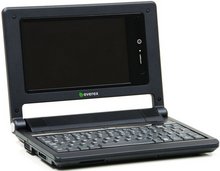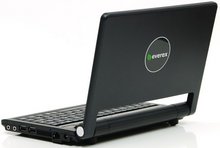“Cloudbook” UMPC to run Googlish Linux
Dec 9, 2007 — by LinuxDevices Staff — from the LinuxDevices Archive — views Everex has confirmed plans to ship a UMPC (ultra-mobile PC) with a 7-inch screen, similar to competitor Asus's EEE PC. A source close to the company revealed that the device — codenamed “Cloudbook” — will ship with the Google Apps-oriented “gOS” Linux distribution early next year.
Everex has confirmed plans to ship a UMPC (ultra-mobile PC) with a 7-inch screen, similar to competitor Asus's EEE PC. A source close to the company revealed that the device — codenamed “Cloudbook” — will ship with the Google Apps-oriented “gOS” Linux distribution early next year.
digg this story |
According to our anonymous source, the initial Cloudbook model will be powered by a Via C7 ULV processor clocked at 1.2GHz, and come with a 30GB hard drive. It will ship in mid-January in two models, one of which will have a 1.2MP webcam. In general, the hardware appears to closely resemble Via's Nanobook design.
Preceding the Cloudbook's mid-January launch, Everex plans to ship a “Developer” version equipped with a touchscreen, our source revealed. That version will come with gOS source code and toolchains, similar to the gOS development board. gOS is an Everex-sponsored Linux distribution optimized for use with Google Apps.
Everex itself officially confirmed the Cloudbook's existence Tuesday, when a press release on another topic alluded to a “Cloudbook” UMPC with a 7-inch screen. Our source suggested that Everex would likely launch the Cloudbook at the Consumer Electronics Show in Las Vegas the week of Jan. 7, with consumer availability as soon as Jan. 15.
The Developer edition will launch earlier — possibly on January first. It was originally scheduled for earlier release, but was reportedly delayed by short supplies in the market for 7-inch touchscreens.


Everex “CE1200V,” front and back
(Click to enlarge)
“Standard” Cloudbook
 Asus EEE PC (Click for details) |
The Cloudbook appears to be FIC/Everex's answer to Asus's EEE PC (pictured at right), another ultra-mobile Linux-powered PC that began shipping earlier this fall. Like the EEE PC, the Cloudbook will use a 7-inch WVGA (800×480) LCD display, along with an identical keyboard, albeit in a different color, our source close to the company said.
That's where the similarities end, though. The EEE PC uses a 900MHz Celeron processor, whereas Cloudbook will use a Via C7 ULV (ultra-low voltage), clocked at 1.2GHz. And, instead of the EEE PC's 4GB SSD (solid-state disk), the Cloudbook will pack in a 30GB hard disk drive.
Other preliminary Cloudbook specs confirmed by our source include 512MB of RAM, built-in wired and wireless Ethernet interfaces, a 4-in-1 card reader, a pair of USB 2.0 ports, and DVI-out. Thanks to DVI-to-HDMI and other available converters, the Cloudbook should “hook up to most multimedia equipment,” said our source, citing projectors and TVs with digital interfaces.
Developer edition
Unlike standard Cloudbook models, the Developer edition will include a touchscreen interface. It will also include some kind of expansion interface for modules that will include a webcam, cordless Skype phone, and retro LCD alarm clock module.
The Developer model appears to serve two intents for Everex. The company likely plans to add a touchscreen to second-generation Cloudbook models, and hopes to ensure the best touchscreen support possible in gOS by offering developers of gOS's Enlightenment E17 window manager actual hardware on which to tune, test, and improve touchscreen support. Similarly, the GNOME desktop computing environment and lightweight Matchbox window manager gained improved touchscreen support during the development of Nokia's 770 Internet tablet several years ago.
Another intent is to offer open source community developers a chance to get their applications on what could prove to be a very popular device, if the EEE PC is any indication. Our source said, “[Everex] will take some apps [developed by the community] to market with the next iteration of the unit, creating instant business opportunities.”
Availability
The standard Cloudbook is expected to ship on Jan. 15, priced at $400 with a 30GB hard drive. The touchscreen-enabled Developer Unit should arrive a few weeks early, possibly on Jan. 1, at an as-yet unknown price.
This article was originally published on LinuxDevices.com and has been donated to the open source community by QuinStreet Inc. Please visit LinuxToday.com for up-to-date news and articles about Linux and open source.